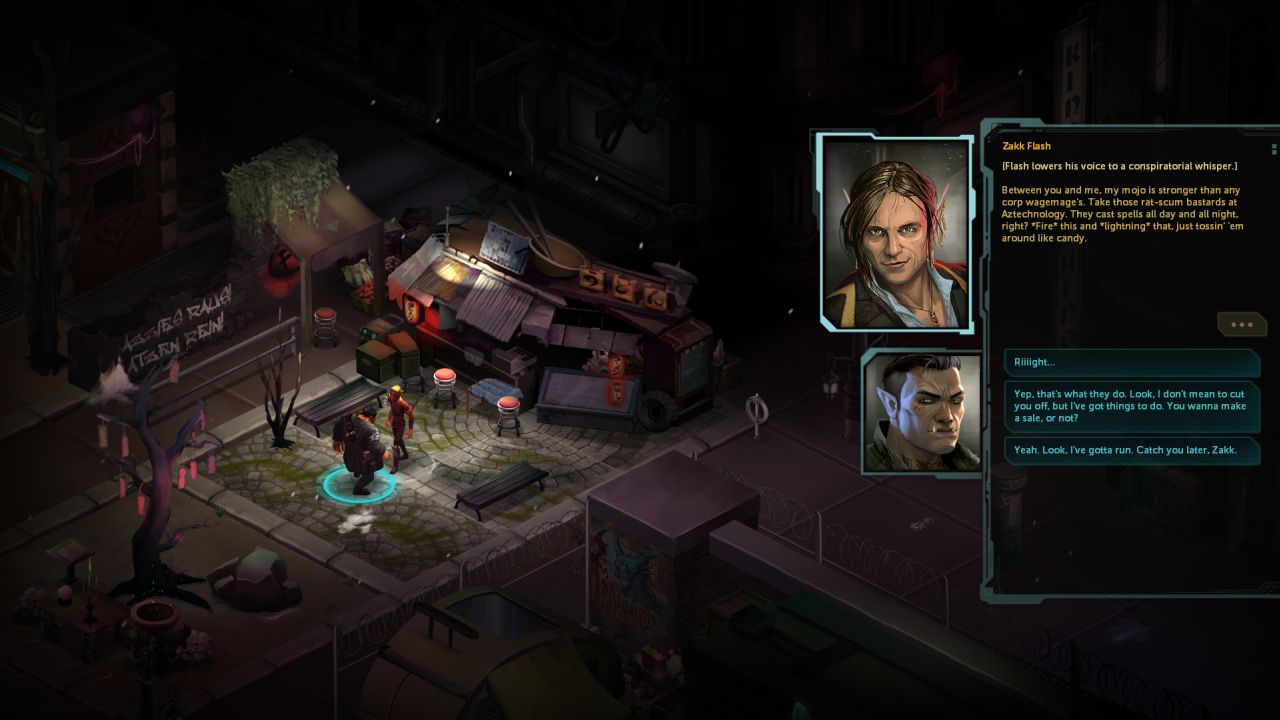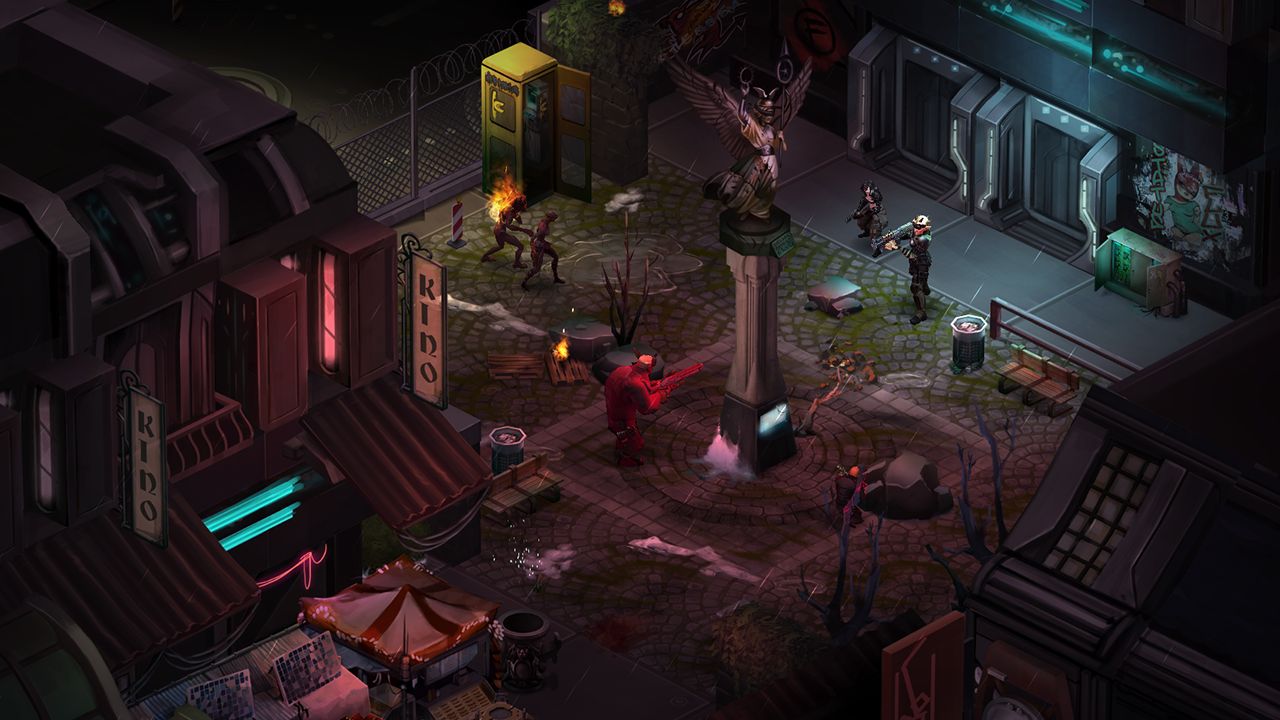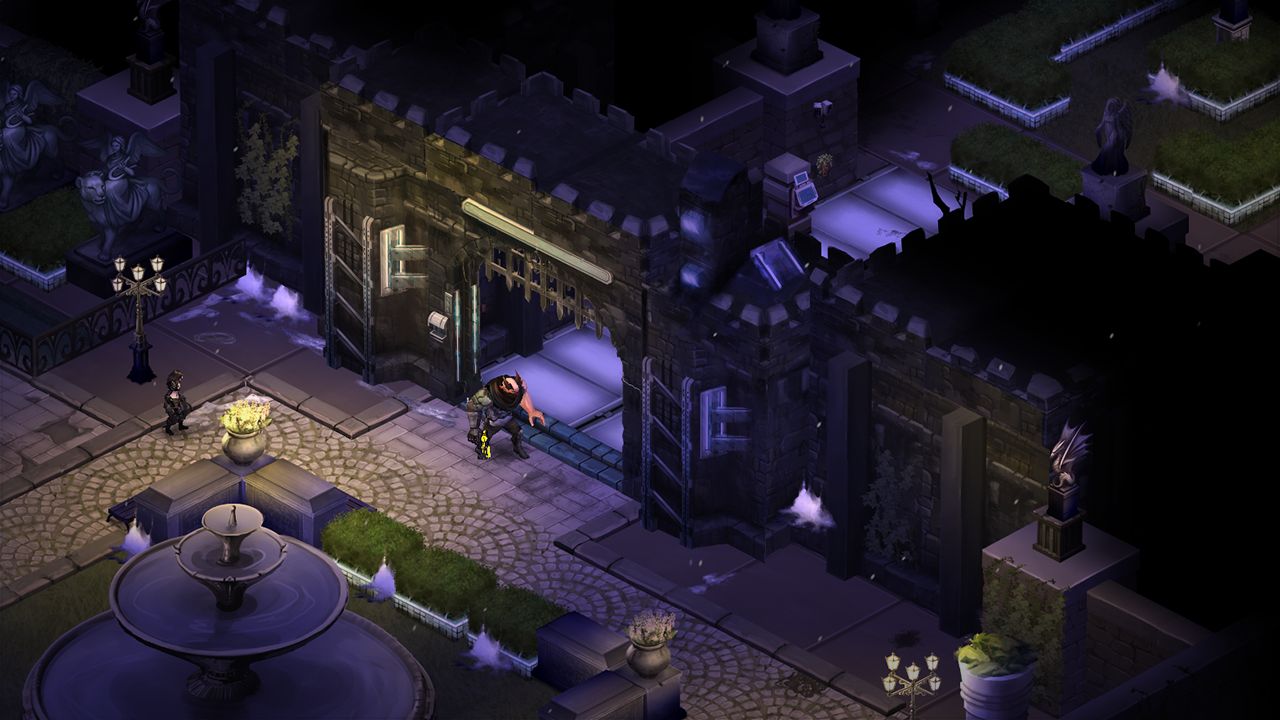Shadowrun: Dragonfall Review
Last summer’s Shadowrun Returns fulfilled developer Hairbrained Schemes’ promise of an RPG set in the Shadowrun universe. The beloved tabletop RPG which blends fantasy and sci-fi in a not-too-distant future was given a video game reboot. Unfortunately, Shadowrun Returns was a mixed bag, blending choice-based dialogue with turn-based combat. While game was well-made, its level design lacked creativity and a couple of features – such as manual saves – were overlooked. Where Shadowrun Returns failed to deliver the game’s expansion, Dragonfall, sticks the landing, providing interesting narrative and engaging level design. Returns might have been the product Kickstarter backers got last year, but Dragonfall is the game that true Shadowrun fans deserve. The only thing that restrains Dragonfall from being a great game is the fact it is still living in the body of Shadowrun Returns.
While Dragonfall is labeled as an expansion of Shadowrun Returns, it feels like a sequel to the original game. Granted, the X-COM-like combat is much as it was before, a turn based affair in which your characters have multiple moves and take cover to better protect themselves while engaging in shootouts. Also, interaction is still a lot of reading and clicking, with droves of lore being thrown at you. It isn’t the core of Dragonfall that feels different and it isn’t the minutia, it is the mid-level design choices that set the expansion pack apart.

Dragonfall requires Returns in order to be played, but the games feel like separate entities. The biggest, and most important change to Dragonfall is the nature of your team. In Shadowrun Returns, characters often came and went, leaving you without a feeling of comradery. You might have characters join you on certain missions, but there was no core team. Dragonfall injects you into an established core of characters and encourages you to get to know them. It is a more traditional and structured form of character interaction, akin to Bioware’s set-up. Having a core team from the get-go allows for some real relationship building between you and the other characters. In-between missions you can talk to your team members or you can wander the streets of your neighborhood, finding shops and side missions. It allows Dragonfall to feel more open, organic, and alive than the stiff and empty corridors of Returns.
After you have visited shops, done a side mission, and seen the sights of the game’s new Berlin location, it is time to do some mercenary work. Dragonfall’s mission structure is split into two sections. The first section allows you to pick between a handful of missions, and go on jobs for employers. The second section prods you along a specific linear narrative. The early structure is more fun, meeting with shady people, running missions comprised of a gray morality allows you immerse yourself in a dark world, doing dark deeds. The second half is serviceable, but after getting to choose missions and play as a gun-for-hire, the heroic storyline feels a bit forced.

Whether the missions are part of your mercenary work or a part of the story, they are all fresh and interesting in their own way. Very little of the game is, “Find So-and-so” or “Kill So-and-so”. Oftentimes the mission will hinge on adding in a variable to spice up the game’s X-COM-esque combat, like setting a bomb and trying to escape. Each level has a few paths, giving the game a breath of fresh air after Returns’ more linear design. In Dragonfall you can often go from-A-to-B-to-C, but if you take the road less travelled you are often rewarded with new paths and more options. Searching for a hidden passage could give you the drop on an enemy and avoid a trap. The game rewards the player for this exploration and with the unforgiving combat, it almost seems necessary to try and find any advantage you can get.
Dragonfall is not hard, but its encounters pay homage to the cold disempowering dependence of dice rolls. Based on health, cover, skill, and weapon, the game calculates a to-hit percentage for each team member. I had numerous experiences where a 60% chance to hit would result in a string of misses, which can be incredibly frustrating, making Lady Luck your real enemy. That being said, there is still plenty of skill required when playing Dragonfall and when you have a good strategy no matter of bad luck can derail you.
After completing your mission and heading back to base, you earn karma that is used to upgrade your character. Much like Returns, one of the big shortcomings in Dragonfall is the fact you can not level-up your team, only your character. You also can’t purchase weapons or other gear for them. In Returns the singular nature of the game didn’t highlight this shortcoming, but when you spend so much time fighting alongside the same characters in Dragonfall it becomes more noticeable. The AI levels up your characters, so they aren’t worthless in combat, but it takes some of the personality out of the experience when you aren’t allowed to make these choices yourself.

One of the best aspects to Dragonfall is its campaign. A whole new story and setting makes Dragonfall feel more substantial. The expansion clocks in between 12-15 hours, nearly the same length as Returns. The new narrative has better pacing than the original game, with a more grandiose plot and stronger cast of characters. it is a linear experience, but characters seem to respond to your choices with more variety. While Returns dialogue options felt like connecting the dots, Dragonfall feels like you are actually coloring in the narrative. The choices you have boast more shades of grey, making it difficult to make decisions. These decisions make it easier to become invested in Dragonfall.
Much like Returns, the art of Dragonfall has the same beautiful hand-drawn backgrounds, however eventually the sterile military bases, medical labs, and corporate buildings feel a bit old-hat. While the drawn settings are gorgeous, everything else still leaves a lot to be desired. The character models look dated and the combat lacks weight. All in all the presentation fails to leave an impression. At least the low demand technical specs leave the game in a consistently stable state. There are a lot of load screens, but the game never crashed or had graphical hiccups.
Despite being an expansion, Dragonfall feels like a more complete and coherent package than the game it is attached to. The expansion is equal to the original content in terms of size, but tells its story and builds its characters with more skill and confidence. Dragonfall’s combat will come up with new ways to challenge you, give you varied objectives, and make you play creatively to survive. The choices are more difficult, the paths of a mission create more variety. It is hard to justify the purchase of Shadowrun Returns so you can enjoy Dragonfall, but even if the original game left you underwhelmed, Dragonfall is the game you really wanted.
